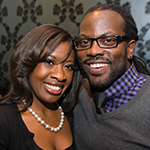
Supporting Your Partner in a Two-Career Family.
I am not a dentist, but I’m married to one. My wife, Michelle Cannon-Hubbard, D.D.S., and I have been married for nearly three years. Michelle has been in practice for more than seven years. She worked in the public health sector for several years before finding a great fit in a private group practice.
As for me, during the past six years, I’ve worked in higher education and more recently, I joined the faculty as the Assistant Professor for the School of Business and Nonprofit Management at North Park University—a small liberal arts institution located on the north side of Chicago, IL.
My growing area of interest as a professor is adaptive business practices. I want to help professionals apply managerial and leadership models in their workplaces so they can meet their personal or professional goals, whether it’s being a better team player or learning how to resolve conflict. My background and life experiences may not be the same as yours, but many aspects of dentistry and supporting a spouse in his or her career are universal.
I didn’t envision that my wife and I would embark on this journey of adaptive business practices but I’m glad we did. For the past couple of years, my wife has introduced me to the world of dentistry. During this time, Michelle has most often been the teacher, while I’ve sought to learn. At times I’ve been able to offer my expertise, and more importantly, be a supportive spouse to her.
Prior to our marriage, my life was far removed from the daily activities in a dental office. However, Michelle and I have learned some important lessons that we’ve found extremely helpful. The following are some of the lessons we’ve learned.
The Outsider
A dental office is a complex, dynamic place. When I first visited my wife’s office, I was taken aback by the level of intensity. I saw assistants working with patients, receptionists answering phones, hygienists doing cleanings, and the actual work of chairside dentistry happening in the midst of this organized chaos.
Dentists wear a lot of hats, even if you’re not an owner. If things aren’t running smoothly in the organization, it can prevent you from doing what you have been trained to do—dentistry.
When I brought this observation up to Michelle, she didn’t see chaos or complexity. To her, it was just everyday dentistry. But because my work is in organizational leadership, it allowed me to identify the layers of what was going on in the organization.
Michelle was just doing her job. It never occurred to her to consider job titles and expectations, etc. Those layers of organizations are areas that I am well-versed in. In the dental practice, I noticed layers of responsibilities and complex dynamics.
At dental school, you are taught to be a dentist. Typically, dentists don’t learn much about running the multi-layers of the business. An outsider’s perspective can provide insight into aspects of the practice that dentists may not see. Conversely, until I saw my wife in her professional setting, I had no idea the complexity and seriousness of her work.
Emotional Intelligence
As Michelle and I discussed the interactions within the dental practice, the work of psychologist Daniel Goleman, Ph.D. (bestselling author of Emotional Intelligence) became prominent. Goleman suggests that being intellectually intelligent is the tip of the iceberg regarding how people understand one another. In other words, being smart isn’t always the best predictor of success.
Emotional intelligence (also called the emotional quotient or EQ) is the ability of individuals to recognize and utilize emotional information—and is an equal, if not better, predictor of success than a person’s intelligence quotient (IQ). People with a high EQ possess the ability to understand their own emotional capacity and understand others’ emotional capacities. They can use those emotions to govern how they interact with other people.
In an organizational environment, such as a dental practice, understanding your emotions and how they drive the way you interact with people is a highly valued skill. People with a high EQ quickly pick up on non-verbal cues within the organization. I saw this going on constantly in Michelle’s dental office. A lot of what governed the “organized chaos” was implicit in daily interactions. Often, coworkers didn’t say much out loud, but they still said a lot. You must be emotionally intelligent to pick up on these implicit conversations.
In a dental office, three different cultures are primarily at play. The first culture is found in the front office. In this area, staff members interact with “external stakeholders”—the patients and their families. The next culture is the “assistant” culture—which includes mostly auxiliary and support. Finally, you have the hygienist and the dentist culture, which also have different goals. All three groups have different boundaries of expectations from the front to the back of the office.
Inevitably, as with any organization, there is conflict. Every organization has clashes in terms of expectations and the ability to think and respond appropriately. For instance, when a staff member walks out hurriedly from the operatory, is he or she upset at the dentist or the patient or both? If he or she is upset, how do we know? Are we labeling the emotional response correctly?
The ability to discriminate between emotions and to correctly identify emotions in the dental practice can lead to understanding the organization as a whole. The next step is to identify how spouses can offer support within this complex environment.
Three Areas of Focus
Understanding and empathy are hallmarks of support in any relationship. The following are three ways to increase understanding with your dentist-spouse. The first suggestion is simply getting to know the dental industry and your spouse’s career on a local level. Get to know your spouse’s colleagues. Get to know what the office looks like and how people interact. Then, get involved in learning about dentistry as a profession. It sounds simple, but it gives understanding and underscores what empathy looks like.
Understand the Local Environment
For Michelle and me, my understanding increased after I began driving her to work when the weather was bad. Since I’m a professor, I work from campus a couple of days a week, but most of the time I can do my work anywhere. That meant that I could drive Michelle to work, do my work while she was working, and drive her home. But while I was at her office, I also talked to the assistants and to the front desk staff members, and I was able to observe the dynamics of the office. I got to know the other dentist in the office. By just being friendly, I got to know more about dentistry.
Involvement to this degree may not be possible for every spouse, since other professions may not offer the same flexibility as mine. But the idea of getting to know the industry and getting to know colleagues can happen in other ways. For instance, go to the office holiday party or office social events. A lot of spouses avoid getting involved on a social level, but doing so is a critical way to increase understanding and empathy. Most literature around career dynamics suggests that close proximity breeds understanding and empathy. Therefore, if you can see your spouse’s environment and experience it firsthand, you will better understand the organization and the emotional fortitude that it takes to be a dentist. The idea is simple. It’s classic industrial organization psychology and what happens in social dynamics—if I walk a mile in your shoes, I can understand your story better.
Driving Michelle to work yielded understanding, too—Michelle works about an hour away from our home. I discovered that her morning commute was nerve-wracking! It was stressful on her body. Not too long after I started driving her to work, Michelle and I re-examined our financial priorities and we decided that the best thing to do was to get her a new car. Previously, she was driving her old dental school car. We upgraded to a luxury vehicle. That’s understanding and empathy on a practical level. I realized that if she was going to drive this route everyday, she should drive a nice car to help improve her mood and make the drive itself less cumbersome.
It takes a conscious effort to be aware of your spouse’s needs. Many times we get so busy in our own lives that it’s hard to think beyond our own needs. Taking a step back can help us see practical ways to increase understanding and empathy.
Learn About Your Partner’s Profession
The second area of support is to move beyond understanding the local office and the local organization and get involved in learning about dentistry in general. Continuing education (CE) drives a lot of the outside functions of any dentist who is engaged in his or her work. For Michelle and me, getting involved in dentistry on a general level meant attending CE together.
A few years ago, Michelle signed up for the New Dentist Program with the Dr. Dick Barnes Group, which included six different courses. The first one she attended by herself. Then, for the next class, I offered to go with her. She was surprised that I wanted to go. Initially, I anticipated just going along for the trip and any external activities outside of the course. But when Michelle mentioned to the instructor that I was visiting, he told her that I could come to the class.
Attending CE classes with Michelle gave deeper insights into the world of dentistry. It also helped me gain a little more understanding about what dentists do. The instructors kept using the phrase, “We’re in the business of changing lives.” My initial reaction was skepticism, honestly. It sounded like a sales or marketing pitch. Whose life are you really going to change? But during the course, I saw an actual patient before and after a full mouth reconstruction. Before, the patient smiled, but not fully. What she didn’t say spoke louder than what she actually said. After the procedure, the difference was visible. Her confidence had completely changed. Her life had changed! In this way, dentistry was changing lives and I was able see firsthand how dentists can really impact their patients.
Participating in continuing education contributed to a huge progression in understanding and empathy. Now, my wife is not just a dentist. She is in the business of comprehensive dentistry that is all about changing the lives of her patients. That shifts the perspective entirely.
On a very practical level, getting involved at such a level requires the spouse to suspend their judgment. It requires an ability to govern your own emotions while being mindful of others’ emotions. It’s not just showing up but showing up with a purpose, asking questions, and trying to understand.
Now that I have attended CE classes with my wife, I have experiences that paint a clear picture of reality. It’s not just sales. The conversation is far more involved than that. It has been an interesting experience. It has kept us up at night talking. I think we have gotten closer as a couple because of it.
Attending CE with your spouse is not the only way to get involved on the general level. You can also learn more by reading dental magazines to learn what is going on in the industry. I also listened to CDs by Dr. Dick Barnes (“The Structure for a More Productive Dental Practice”) in the car. Reading magazines and listening to CDs are things that any spouse would be able to do.
The Personal/Professional Connection
The last (but not least) critical area of support is to get to know your spouse as a professional and not just a person. As I talk with other dental spouses, I’ve found that some people don’t really understand dentistry through the lens of their spouse. It can lead to a clash of expectations. Many people tend to be somewhat different in their personal lives and their professional lives. Michelle is definitely that way. In general, as a professional, her inclination is to be introverted, somewhat shy, and a quiet individual. She does a lot of processing in her mind. She doesn’t say a lot. But in her personal life—the Michelle that I am most acquainted with—she is more open and talkative.
Michelle and I invested a lot of time to get to know each other personally through all the things that we typically do, but it took extra effort to get to know my wife as a professional. Instead of looking at Michelle as “my wife,” to truly understand her, I need to see her as “Dr. Cannon.” Again, this perspective changes the conversation.
In the professional environment, everyone addresses her as Dr. Cannon. It forces me to think about her through that lens. The empathy she has for me at home isn’t necessarily the same type of empathy she needs to have with a patient who, if they don’t make a decision to get their dental work done right now, will have no other option other than to get all their teeth pulled out and to get dentures at a later time. It helps for me to differentiate between how I see her interact with her patients or her staff or the front office. It’s a different nuance there.
Intersectionality
The concept of intersectionality can help with understanding the difference between a person and his or her profession. A scholar named Kimberlé Williams Crenshaw coined the phrase intersectionality, meaning that people are the sum of the categories that we use to understand each other. For example, Michelle is not only my wife, but she’s a young African-American dentist from Chicago in the predominantly male, Caucasian-dominant industry of dentistry. How do I understand her against the backdrop of these complex categories within which she is often placed? What does that mean then as a spouse to understand the nuances? It’s germane to the larger conversation of what real support on an emotional, psychological level looks like.
There always is some kind of intersectionality that affects an individual’s experience—whether it’s education, social economics, gender, race, or experience—these are all categories that we use to understand one another.
To understand Michelle’s experience as a dentist, I have to understand her background. When she graduated from dental school, she was 27 years old, but she looked—and still looks—much younger. And her gender puts her in a minority. People often assume that Michelle is a dental assistant.
In my own professional life, I have had similar experiences. For instance, when I walk into my classroom, I am often perceived as being a student. I always have to make an entrance or get there early. If I come in with everybody else, students often wonder why I’m up front at the teacher’s podium. Seeing Michelle in her professional environment—at the office and in CE—helped me better understand what it is like to be Dr. Cannon.
Benefits for Everyone
Getting to know different aspects of your spouse’s profession and getting to know your spouse as a professional can help you better understand your spouse in general and increase empathy for them. Trying to understand Michelle as a dentist has improved our relationship and helped me professionally as well.










Excellent article!